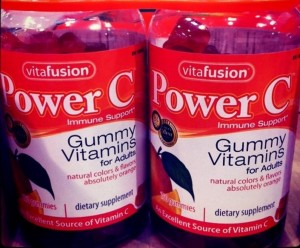Back when we were kids, our parents would often remind us to eat our fruits and vegetables and possibly, when we were sick, Vitamin C. Vitamin C is an essential vitamin that positively benefits our body and is present in foods, such as oranges, and even as gummy candy. Since Vitamin C gummy candy tasted pretty much like candy, it made eating it a lot easier compared to other medicine; however, does Vitamin C actually have an effect on the common cold?

Children’s Gummy Vitamin C (Flickr Commons – Source: Charles Huertu)
When it comes to Vitamin C, a recent news article quotes Catherine Price saying Vitamin C does not help prevent the common cold from occurring or cure the common cold in her book about vitamins. In support of her claim, Price provides reasons as to why she believes the public would believe such a thing.
“The first reason is Linus Pauling, the Nobel-winning scientist who became convinced in the 70s that super-doses of vitamin C would prevent and cure colds”
Linus Pauling (Wikimedia Commons – Source: Nobel Foundation)
One of the reason’s Price provides emphasizes a type of bad science that deals with celebrities or famous individuals who make statements that may be scientifically inaccurate or detrimental to society. In the example provided, the person who makes this statement is not just some Hollywood actor or actress, but a Nobel Prize recipient. If such a smart or talented individual says Vitamin C prevents and cures the common cold, why should we question their statement?
To determine the effects of Vitamin C on the common cold, a study conducted by Hemila et al. analyzed 29 separate trials spanning approximately 11,000 participants and the incidence rate of the common cold. They found that Vitamin C did not prevent the occurrence of common cold in the normal population; however, they found that taking ≥0.2 g/day of Vitamin C as a supplement helped reduce the duration of the common cold in adults by 8 % and in children by 18 %.
As evidenced by the results, both Catherine Price and Linus Pauling were both partially correct. Vitamin C does not cure or prevent the common cold, but its benefits include decreasing the duration of the common cold. Despite their findings, Hemila et al. recommend people to try Vitamin C as a supplement on an individual basis to see if Vitamin C benefits them, but also advise people to avoid taking Vitamin C regularly on a long-term basis.
For me personally, I think taking Vitamin C tablets are a good source of Vitamin C, especially if fruits and vegetables are not regularly eaten. There is no harm in ingesting the Vitamin C tablets, other than the money that was used to purchase the vitamin; however, the potential benefits can include a decrease in the duration of sickness and less severe symptoms which can make an untimely cold not as bad.
Therefore, try some Vitamin C tablets the next time you are sick, you never know what may happen!
Adrian Li

